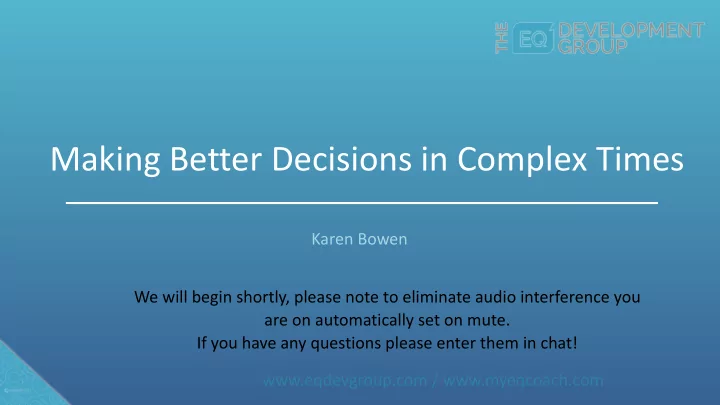

Making Better Decisions in Complex Times Karen Bowen We will begin shortly, please note to eliminate audio interference you are on automatically set on mute. If you have any questions please enter them in chat! www.eqdevgroup.com / www.myeqcoach.com
What Today Is About • Emotions Values & Beliefs • Decision Making Approaches • Bias • Risk www.eqdevgroup.com / www.myeqcoach.com
www.eqdevgroup.com / www.myeqcoach.com
Understanding Emotion “The process of thinking requires feeling, for feelings are what let us understand all the information we cant directly comprehend. Reason without emotion is impotent.” www.eqdevgroup.com / www.myeqcoach.com
Beliefs & Values • Beliefs are “Decision Making Filters” • Values are “Decision Making Lenses” www.eqdevgroup.com / www.myeqcoach.com
“In a knowledge based economy, we propose that a knowledge worker’s primary deliverable is a good decision.” How Can Decision Making Be Improved? Milkman, Chugh, Bazerman. 2008 www.eqdevgroup.com / www.myeqcoach.com
What Is A Decision? Source: https://www.google.com/search?q=what+is+a+decision www.eqdevgroup.com / www.myeqcoach.com
Common Challenges • Lack of clarity on desired outcome • Overconfidence • Moving too fast • Perceptual Narrowing • Avoidance • Information Overload • Information Underload • Cognitive Bias www.eqdevgroup.com / www.myeqcoach.com
Complexity You are here. CONFUSION www.eqdevgroup.com / www.myeqcoach.com
How We Decide “Truly successful decision-making relies on a balance between deliberate and instinctive thinking.” - Malcolm Gladwell www.eqdevgroup.com / www.myeqcoach.com
Two Approaches Source: Schwarz – The Paradox of Choice, Wiley, 2005. Maximizers Satisfiers • Will research only to the extent they feel necessary. • Will research extensively • Will continue to look for new • Will choose an option that they feel is ‘good enough’. alternatives even after suitable • Tend to make decisions more quickly. choices have been identified. • Will always aim to make the best • Are more content with their choices possible choice. (less concerned with alternatives they • Tend to mull over decisions at length. didn’t choose) • Are often less content with their choices after the fact. www.eqdevgroup.com / www.myeqcoach.com
Which Is It For You? • What do you consider to be some of the advantages of your approach? • What do you consider to be some of the disadvantages? www.eqdevgroup.com / www.myeqcoach.com
Intuitive/Rational More Intuitive Experimental More Intuitive / Experiential More Rational / Analytical Complete Ambiguity Risk Certainty Ignorance (The possible outcomes (The outcome (only a single (not even possible are known, but their probabilities are outcome is known outcomes are probabilities are not) specified) to result) known) Adapted from: Starcke and Brand, 2011: Decision Making Under Stress: A Selective Review & Epstein, Pacini, Denes-Raj, and Heier, 1996: Individual differences in intuitive-experiential and analytical rational thinking styles. www.eqdevgroup.com / www.myeqcoach.com
Exploring the YOU in Decision Making www.eqdevgroup.com / www.myeqcoach.com
Cognitive Biases A systematic error in thinking that affects decisions and judgments. Cognitive biases may sometimes lead to perceptual distortion, inaccurate judgment, illogical interpretation, or what is broadly called irrationality . www.eqdevgroup.com / www.myeqcoach.com
Bias Blindness… “…these are not just occasional errors in judgment but rather routine mistakes, barriers to logic we stumble over time and again, repeating patterns through generations and through the centuries. For example, it is much more common that we overestimate our knowledge than we underestimate it.” - Rolf Dobelli www.eqdevgroup.com / www.myeqcoach.com
Cognitive Bias (just a few) • False Consensus Effect • Curse of Knowledge • Reactive Devaluation • IKEA Effect • Ostrich Effect www.eqdevgroup.com / www.myeqcoach.com
False Consensus Effect www.eqdevgroup.com / www.myeqcoach.com
Curse of Knowledge www.eqdevgroup.com / www.myeqcoach.com
Reactive Devaluation www.eqdevgroup.com / www.myeqcoach.com
IKEA Effect source: www.sketchplanations.com www.eqdevgroup.com / www.myeqcoach.com
Ostrich Effect www.eqdevgroup.com / www.myeqcoach.com
Evidence Based Decision Making Decision Based Evidence Making www.eqdevgroup.com / www.myeqcoach.com
www.eqdevgroup.com / www.myeqcoach.com
Where Does Risk Fit? www.eqdevgroup.com / www.myeqcoach.com
The 8 Risk Types www.eqdevgroup.com / www.myeqcoach.com
Risk Type & Decision Making www.eqdevgroup.com / www.myeqcoach.com
Risk Type in Working Population www.eqdevgroup.com / www.myeqcoach.com
10 Ways To Make Decisions Better www.eqdevgroup.com / www.myeqcoach.com
1.Take Care Of Yourself www.eqdevgroup.com / www.myeqcoach.com
2. Beware Decision Fatigue www.eqdevgroup.com / www.myeqcoach.com
3. Acknowledge The Feeling www.eqdevgroup.com / www.myeqcoach.com
4. Slow Down, or Even Stop www.eqdevgroup.com / www.myeqcoach.com
5. Delegate What You Can Leader Centered Subordinate Centered Use of Authority by Leader Area of Freedom by Subordinates Leader Leader Leader Leader Leader Leader Leader permits presents presents presents defines makes and sells subordinates to problems, gets ideas and tentative limits; asks announces decision function within suggestions, invites decision group for decision defined limits makes questions subject to decision decision change. Tannenbaum & Schmidt (1973) www.eqdevgroup.com / www.myeqcoach.com
6. Seek Support www.eqdevgroup.com / www.myeqcoach.com
7. Seek (Some) More Information www.eqdevgroup.com / www.myeqcoach.com
8. Discuss Decisions www.eqdevgroup.com / www.myeqcoach.com
9. Make More Decisions “Be willing to make decisions. That’s the most important quality in a good leader. Don’t fall victim to what I call the ‘ready-aim-aim-aim-aim’ syndrome. You must be willing to fire.” T. Boone Pickens www.eqdevgroup.com / www.myeqcoach.com
10. Learn From Your Successes (and Mistakes) www.eqdevgroup.com / www.myeqcoach.com
Connect With Us… LinkedIn: • Karen Bowen • Drew Bird Email: • karen@eqdevgroup.com • drew@eqdevgroup.com www.eqdevgroup.com / www.myeqcoach.com
Recommend
More recommend